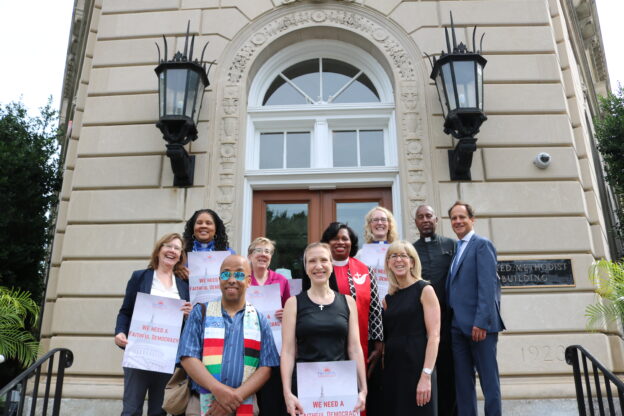
The Current State of Democracy Reform Legislation in Congress
Sister Quincy Howard, OP
September 14, 2021
Democrats have put voting rights, along with an overhaul of election and campaign finance laws, at the forefront of their agenda upon return in September. The John Lewis VRAA (H.R.4) would restore the Justice Department’s authority over election law changes in jurisdictions with a history of discriminatory voting practices against minorities. The For the People Act (S.1) sets minimum state standards for early voting and voting by mail, and overhauls campaign finance and election laws. Now, a new democracy bill – the Freedom to Vote Act (S.2747) – contains many of the same provisions to protect our elections as the For the People Act, and reflects the feedback the House Rules Committee received from state and local elections officials. Find a summary of the Freedom to Vote Act here.
Previously, the House has passed both the For the People Act and the John Lewis Voting Rights Advancement Act along party lines. Senate Majority Leader Schumer promised that voting rights would be a top priority for the chamber after the Senate’s August recess. He reiterated the promise right after they returned. New state laws passed by Republican-controlled legislatures and the kick-off of the redistricting process this month makes passing legislation that protects our democracy urgent.
H.R.4 responds to the Supreme Court’s 2013 Shelby County v. Holder decision that invalidated the mechanism the Department of Justice (DOJ) used to determine which jurisdictions needed approval before they could change voting laws. Named for the late Representative John R. Lewis, H.R.4 focuses on the DOJ oversight. In addition to restoring its authority over election law changes in some states and jurisdictions, the bill would update criteria used to determine when preclearance is needed for changes. Any state or jurisdictions that had 15 or more violations in the past 25 years would need preclearance. H.R.4 passed the House — for the first time along party lines — in mid-August and will be taken up by the Senate.
These democracy reform efforts also have a subtext: this is a key issue used by progressives to call for an end to the Senate filibuster. The Senate filibuster makes it all but certain that no voting bills can proceed under current Senate rules. Twice this summer the Senate tried to advance the For the People Act but failed to reach the 60-vote threshold.
Senator Mitch McConnell (R-KY) appears to still have Republicans universally lined up against the measures. Republicans have labeled both House bills an attempted “power grab” by Democrats and have refused to support them on the self-fulfilling rationale that they are too partisan.
There’s no way this legislation or anything like it will get 10 Republican votes in the Senate to overcome a filibuster. Still, our democracy is on the line. It’s now a matter of Democrats finding a strategy to pass it in the Senate with a simple majority.
In a 50-50 Senate, Democrats are under intense pressure to do away with the filibuster. Two Senators, Senators Joe Manchin (D-WV) and Kyrsten Sinema (D-AZ) have thus far resisted that pressure. Prospects for voting bills hinge on whether they will change their views on the filibuster — or whether President Biden will engage to bring them along. The newest bill, the Freedom to Vote Act, was unveiled by Senator Amy Klobuchar (D-MN) on September 14 and builds on a framework offered earlier this year by Senator Manchin. Its reception by Republican Senators will be pivotal. Stacey Abrams supports the new Freedom to Vote Act, saying that it takes the necessary steps to protect our democracy.
At this point, advocates’ attention is focused toward President Joe Biden, a veteran of the Senate, and Senator Joe Manchin to reform the filibuster. Both of them have resisted pressure — along with Senator Sinema — to eliminate the filibuster.







